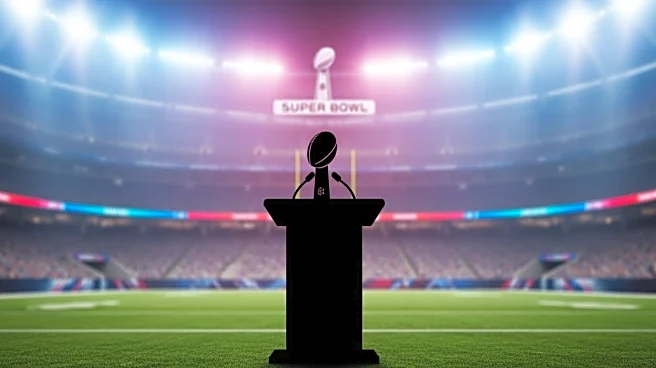What's Happening?
A rumor circulated online claiming that retired Philadelphia Eagles center Jason Kelce defended the NFL's decision to feature rapper Bad Bunny as the headline act for the 2026 Super Bowl halftime show.
The rumor suggested Kelce said, 'If Bad Bunny is a bad fit for the Super Bowl, then maybe the people making these comments are a bad fit for America's future.' However, this statement was falsely attributed to Kelce, who retired from the NFL in 2024. President Trump publicly criticized the NFL's choice, expressing his disapproval of the Puerto Rico-born rapper, who primarily performs in Spanish. In response to the controversy, Turning Point USA announced an alternative halftime show celebrating 'faith, family, and freedom.' Jason Kelce addressed the false quotes attributed to him, stating that unless comments are directly from him, they should not be considered real.
Why It's Important?
The controversy surrounding Bad Bunny's selection for the Super Bowl halftime show highlights ongoing cultural and political tensions in the U.S. The criticism from President Trump and conservative groups reflects broader debates about cultural representation and inclusivity in major American events. The NFL's decision to feature a Latin artist underscores the league's efforts to diversify its audience and embrace multiculturalism. This situation may influence public perception of the NFL and its alignment with diverse cultural expressions. The alternative show proposed by Turning Point USA suggests a divide in how different groups wish to represent American values during such high-profile events.
What's Next?
As the Super Bowl approaches, further reactions from political leaders, cultural commentators, and the public are expected. The NFL may face pressure to address the criticism and justify its choice of Bad Bunny. The alternative halftime show by Turning Point USA could gain traction among conservative audiences, potentially impacting viewership dynamics. Jason Kelce's clarification may prompt other public figures to be cautious about false attributions. The broader conversation about cultural representation in American sports events is likely to continue, influencing future decisions by the NFL and other organizations.
Beyond the Headlines
The incident raises questions about the role of social media in spreading misinformation and the responsibilities of public figures in addressing false narratives. It also highlights the cultural significance of the Super Bowl as a platform for showcasing diverse artistic talents. The debate may contribute to discussions about the balance between tradition and innovation in American cultural events, as well as the impact of political opinions on entertainment choices.









